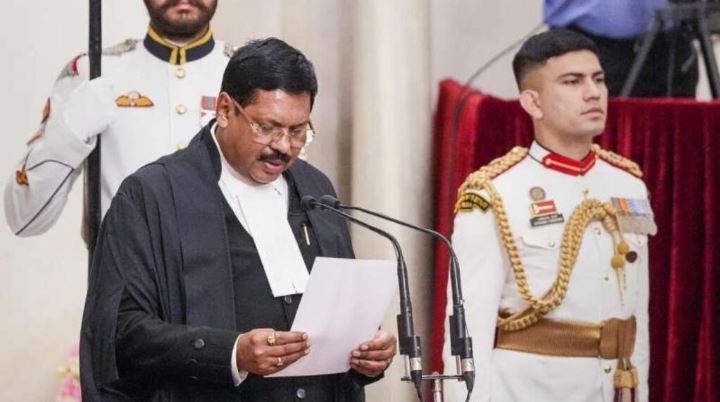 English
English

Justice Bhushan Ramakrishna Gavai was sworn in as the 52nd Chief Justice of the country. Watch full analysis on new CJI in an exclusive show “The MTA Speaks” by veteran journalist Manoj Tibrewal Aakash.

CJI Bhushan Ramakrishna Gavai
New Delhi: Supreme Court Judge Bhushan Ramakrishna Gavai was sworn in as the 52nd Chief Justice of the country at Rashtrapati Bhavan on Wednesday. President Draupadi Murmu administered the oath of office and secrecy to him.
The country's well-known journalist Manoj Tibrewal Aakash analyses about new CJI in his exclusive show "The MTA Speaks."
Born on 24 November 1960 in Maharashtra, Justice Gavai started his career as a lawyer in 1985. Then he was a judge of the Bombay High Court for about 16 years. On 24 May 2019, he was appointed as a Judge of the Supreme Court, where he delivered a number of important verdicts in the interest of the public.
Justice Gavai tenure as CJI will be about 6 months. He will retire on 23 November.
First Buddhist CJI
Justice Gavai is the first Chief Justice of the country who follows Buddhism. His family is also inspired by Dr BR Ambedkar, and his father Ramakrishna Suryabhan Gavai was among those who adopted Buddhism along with Dr Ambedkar.
Ramkrishna Suryabhan Gavai, popularly known as Dadasaheb Gavai, was a politician, social activist, senior leader of the Ambedkarite movement, and founder of the Republican Party of India.

Justice Gavai is the second dalit CJI after Justice KG Balakrishnan in 2007.
The Tough Journey
The journey of life of Justice Gavai has been full of struggles. Though he studied in a slum school, yet has reached the highest position in the Indian Judiciary.
In a speech last year, Justice Gavai said, "It is entirely the result of Dr BR Ambedkar's efforts that a person like me, who studied in a slum school, reached this position."
Important Verdicts Of Justice Gavai
Justice Gavai is known for decisions in the interest of common people. He has given important verdicts in many cases related to politics, including the cases of Manish Sisodia and Congress leader Rahul Gandhi.
In Rahul Gandhi's defamation case, Justice Gavai gave him significant relief and overturned the decision of the Gujarat High Court, after which Rahul contested the elections and won and reached the Lok Sabha.
Justice Gavai has also made significant contributions in cases of creating quotas within SC-ST reservation. He has played an active role in many important cases including declaring the provisions of election funding unconstitutional.
Justice Gavai has criticized bulldozer justice and said that it is wrong to demolish people's houses without following the legal process.
He also leads the Bench hearing pleas of the constitutionality of the Waqf Amendment Act on 15 May.
Waqf Amendment Act Hearing
A Bench of Chief Justice of India BR Gavai and Justice AG Masih asked the petitioners against the amendment led by senior counsel Kapil Sibal and Solicitor General Tushar Mehta, representing the Centre, to file their short written notes by Monday.
“We will be considering the issue of interim relief only on Tuesday,” CJI Gavai said, posting the matter for hearing on Tuesday, 20 May.
The Constitution Is The Supreme
Justice Gavai believes that neither the Parliament nor the Judiciary is the supreme. According to him the Constitution the is supreme.
No Post After Retirement
Justice Gavai has announced that he will not accept any political post after retirement. He believes that judges should not hold any other position after their tenure, so that the independence of the judiciary is maintained.